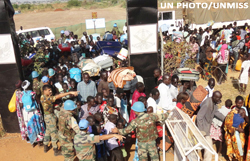
Editor's Note: Lindsey Hutchison contributed to this blog. This is part one of a two-part series on the Final Report of the African Union Commission of Inquiry on South Sudan. Click here to read part 2.
A long-delayed African Union report on the crisis in South Sudan says that the targeted killings of hundreds of Nuer tribesmen in Juba in December 2013, was a deliberate action sponsored by the state. According to the report, the method by which the killings were committed prove their “widespread or systematic nature.” Roadblocks were established around Juba and security forces undertook house-to-house searches. Male Nuers were “targeted, identified, killed on the spot or gathered in one place and killed.”
Titled Final Report of the African Union Commission of Inquiry on South Sudan, the 315-page document is extensive and based on testimonies from key government and rebel leaders, civil society, and ordinary South Sudanese. The report’s public release was delayed for many months, with its cover page dated October 15, 2014.
Key among its findings is that the violence that precipitated the advent of the current war was not a spontaneous and isolated event. The Commission instead “found that struggle for political power and control of natural resources revenue, corruption and nepotism appear to be the key factors underlining the break out of the crisis that ravaged the entire country.”
In particular, the report notes that the current conflict is rooted in weak institutions within the ruling Sudan People’s Liberation Movement (SPLM), that manifested themselves in factionalism as its leaders jostled for power. This factionalism found expression in the military, then engulfed the population along ethnic lines and finally plunged the country into a brutal civil war.
Notably, contrary to the government’s longstanding claim that there was an attempted coup in December 2013, initial fighting began within the Presidential Guard (the Tiger Division) at a barracks of the SPLA. The Commission found that it apparently arose out of disagreement and confusion over the alleged order to disarm Nuer members. The fighting ended up pitting soldiers loyal to President Kiir, who were mostly Dinka, and those loyal to former Vice-President Machar, who were mostly Nuer. After hours of fighting involving other members of the military and organized forces, the fighting spread out into the general population.
The report describes that there are also grounds to believe that atrocities against civilians throughout the conflict in various parts of South Sudan were committed in a widespread or systematic manner. The report describes “crimes such as murder, extermination, torture, rape, persecutions on political grounds as well as inhuman and degrading treatment” being committed against civilians. The Commission found “international crimes which could constitute either war crimes or crimes against humanity include killings/murder, rape and sexual violence (SGBV), forced displacement/removal of populations, abducted children associated with conflict used in servitude and beaten, looting, pillage and destruction of property, disappearances, torture, [and] targeting of humanitarian workers and property.” Other human rights abuses that the report notes are violations of freedom of expression and of the media, and the discrimination entailed in the targeting of individuals on grounds of ethnic origin. The Commission stated that both sides to the conflict have violated human rights, with perpetrators including soldiers, militia, rebels, and civilians.
All of the groups that the Commission met with emphasized the need for accountability for the atrocities committed, especially given the entrenched impunity. The Commission learned that people want an acknowledgement of the wrong deeds done, an expression of remorse, as well as accountability in the form of retributive justice and a formal criminal process to end the rooted culture of impunity. The Commission concluded that criminal prosecution alone is insufficient – there is a clear need for a process to ensure reconciliation and sustainable peace. In order for this to begin, they stated that those with the greatest responsibility for the atrocities at the highest level should be brought to account and mechanisms should be established to address other concerns specific to victims of violations and crimes, which includes reparations.
Many respondents had little or no confidence in the national judicial or political system to deliver accountability particularly in relation to the top political and military leaders. That in combination with the current capacity of the national criminal justice system, led the Commission to recommend an “Africa-led, Africa-owned, Africa-resourced legal mechanism under the aegis of the African Union supported by the international community, particularly the United Nations to bring those with the greatest responsibility at the highest level to account.” These justice and reconciliation initiatives will be essential for helping the country heal.
The Commission’s report also describes their recommendations for addressing institutional weaknesses and longstanding structural issues in South Sudan, including systemic failures in security sector reform. The report recommends a comprehensive review of security sector reform initiatives that include delinking the army from the SPLM and the creation of an ethnically diverse army that “reflects the face of South Sudan.”
Importantly, the report touches on the economic roots of the conflict, noting that the absence of equitable resource management, corruption and the marginalization of various groups in the country was a trigger for conflict. For instance, the report says that top politicians and their families controlled oil revenues, generating discontentment and frustration among the general population. The report calls for the Government of South Sudan to address their resource governance problems, which will require a willingness to be held accountable for the proceeds and management of the wealth created by the oil and the extractive industry, to limit opportunities for corruption and create transparency, and to attempt to realize the development potential of its resources and ensure sustainable development.
Click here to access the full report.

